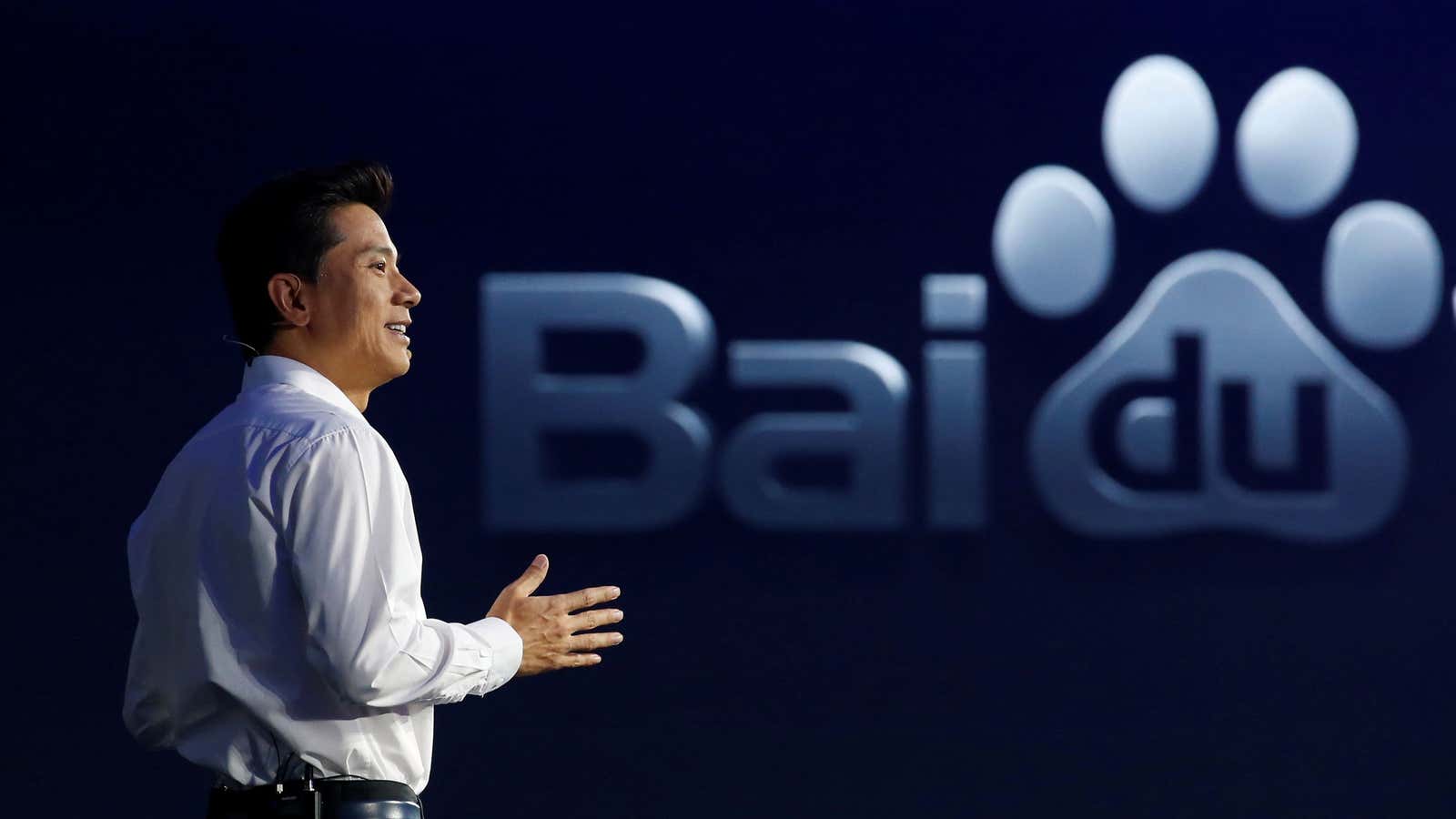Three years ago, the story of a university student who died of cancer after receiving questionable treatment advertised on search engine Baidu sparked a huge outcry, and prompted authorities to order the search giant to overhaul how it positions paid results. Robin Li, CEO of Baidu said in an internal letter at that time, “If we lose our users’ support or fail to stick to our values, Baidu will be only 30 days away from bankruptcy.”
What changes did Baidu make exactly? Baidu is now largely directing people to content published under platforms owned by Baidu, according to an analysis titled “Search engine Baidu is dead (link in Chinese),” by Fang Kecheng, a veteran Chinese political journalist who’s now a media scholar at the University of Pennsylvania’s Annenberg School for Communication.
“Baidu.com is no longer a place for you to search for content on China’s internet, but rather an internal search for Baidu content,” wrote Fang in the piece, which published late Tuesday (Jan. 22) on a WeChat public account he runs. “It won’t lead you to good quality food for the spirit from China’s internet, but content hoarded at home, gone bad.”
By Wednesday afternoon, there were more than 830,000 real-time searches for the topic 搜索百度引擎已死刷屏, or “news on search engine Baidu is dead all over the place” on microblog Weibo. Meanwhile Microsoft’s Bing search engine, one of the few unblocked foreign search engines, saw a surge in user traffic in China, according to a Chinese news report, before becoming unavailable. The Financial Times reported (paywall) that Bing has since been blocked on government order.
As of Thursday (Jan. 24), the piece has garnered more than a million views (video, link in Chinese), its author said.
Walled garden
Fang wrote his critique after searching for content on nine topics in Chinese: China’s 2019 GDP, Brexit, the US government shutdown, Trump, Jamal Khashoggi (the Saudi Arabian journalist murdered in Istanbul last year), Peppa Pig, artificial intelligence, how to buy high-speed train tickets, and how to write a graduate essay. Fang did his searches using the Chrome browser and in stealth mode to prevent results being influenced by his past searches.
Fang found that the largest share of top results generally related to Baijiahao, a Baidu content publishing platform similar to Medium that Baidu started in 2016 in a bid to attract more digital ad earnings. Results on the first page—generally eight or nine links—also directed people to Baidu Baike, an equivalent of Wikipedia, and other Baidu platforms, but Baijiaho dominated.
In one case, all nine items about Jamal Khashoggi on the first page of results came from Baijiahao and Baike. A search by Quartz for Jamal Khashoggi returned a Baike item as the first ranked result, followed by a second item, “latest on Khashoggi” which displayed headlines of news items from different publications. The next three to five results were all from Baijiahao.
“It wasn’t the same situation one year ago, or even five, 10 years ago. Back then, Baidu had all kinds of different problems, but at least it was a real search engine, an entrance for you to explore China’s internet. You could get some satisfactory answers from it,” Fang wrote, noting the worrying quality of some of the Baijiahao results, “…It’s pathetic that given the size of China’s internet, we’ve fallen into a situation where we don’t even have a search engine.”
Criticism of Baidu search isn’t new—yet it remains China’s mainstream platform with 70% of the search market thanks to its long-time visibility and the lack of competitors. While the company has been trying to move into other sectors like autonomous driving, online marketing accounts for 80% of its revenues (pdf, p.4) That requires having large number of users, which creates an incentive to keep users on its platforms. After the 2016 backlash, Baidu developed new platforms to help attract advertising. Baijiahao, rolled out in September that year, is a prominent example. The service currently has 1.9 million users, according to figures Baidu shared with Quartz.
Baidu disputed Fang’s findings in a statement on Weibo (link in Chinese) yesterday, stating that less than 10% of its search results directed to content from Baijiahao. It also said that it was using third-party feedback and artificial intelligence to remove low-quality information, and that the Baijiahao’s platform includes various kinds of media outlets and writers who have “consistently contributed in-depth, trustworthy content.”
Too big to fail?
Fang’s findings underscore why some Chinese users last year backed a plan by Google to reportedly develop a censored search engine for China where it shuttered a China-facing search engine in 2010. Many said it would still be better than Baidu, even if censored.
“There’s a lot in China’s vibrant technology sector that Chinese users can be proud of. Search isn’t one of those areas,” Fergus Ryan, a cyber policy analyst at Canberra-based think tank Australian Strategic Policy Institute said in an email to Quartz.
When Baidu CEO Li published a note in August warning Google to prepare for stiff competition if it returns, one popular comment on Chinese social media read, “Forget it. Can’t you tell from Chinese people’s attitudes that their hearts have turned cold on Baidu?”
But other users say they would rather jump the firewall and use the uncensored Google—than have a made-for-China version. Google, which has faced its own search results controversies, has apparently dropped the plan after an internal backlash against working with China’s censorship regime. China’s internet regulator announced yesterday it had deleted seven million pieces of information and thousands of apps within 18 days (link in Chinese) since launching a fresh online cleanup in early January.
Despite being blocked in China, Google apparently does have a tiny market share in China. China does also have other domestic search engine options—such as Shenma, 360, and Sogou. User experience on those isn’t much better, Ryan said, “but because Baidu is the industry leader they cop most of the criticism.”
